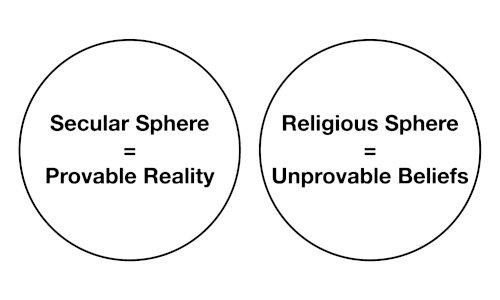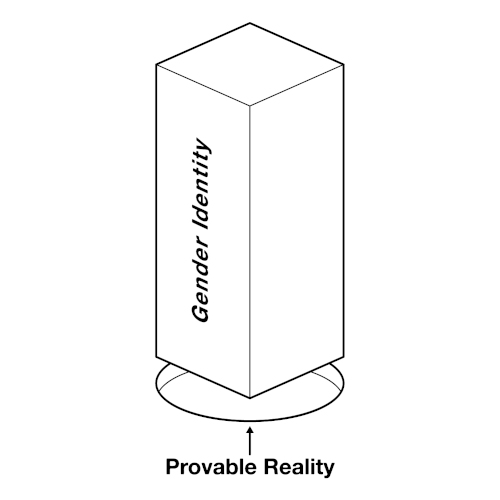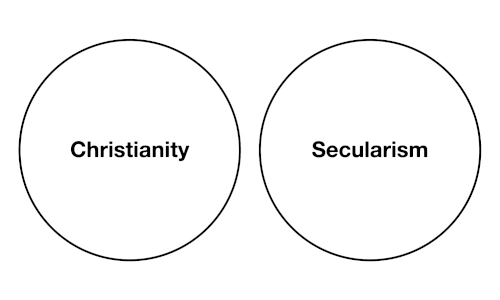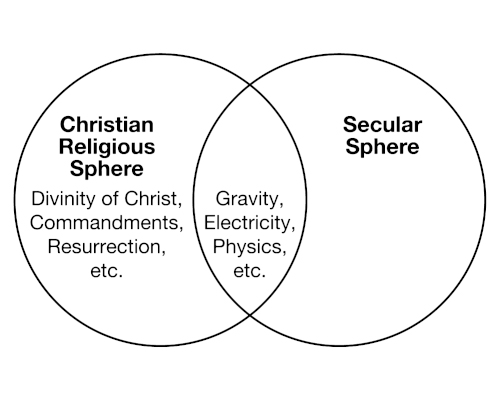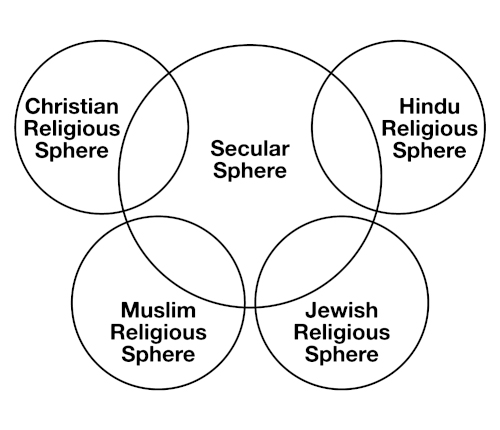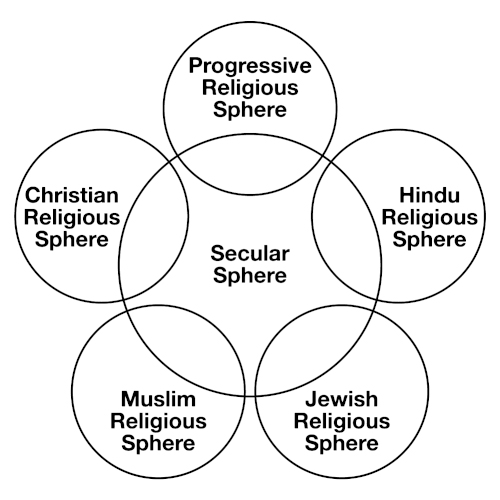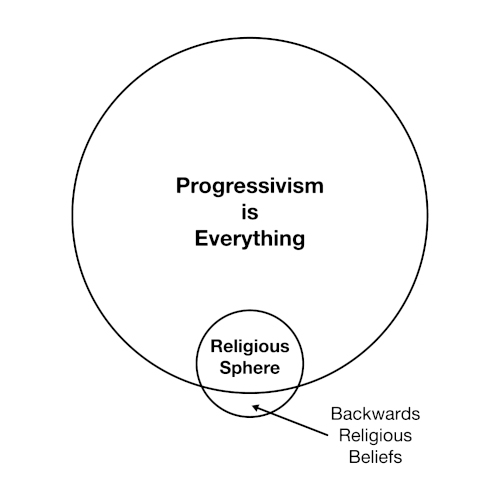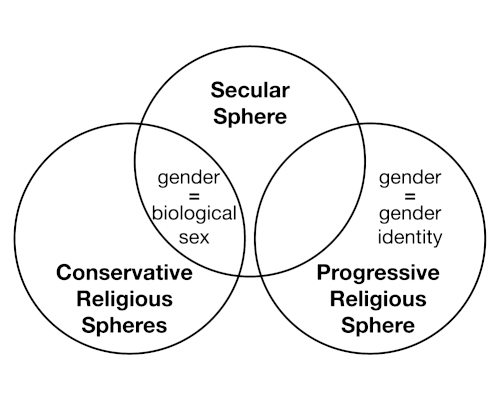How to Talk to Progressives
about Gender Identity
You have the right to be met in the neutral ground of the secular sphere, where provable reality is given precedence over unprovable beliefs like gender identity.
Definitions
Let’s start with some definitions:
Gender Identity: Gender identity is the belief that our gender is based on identity rather than biological sex. In other words, it’s the belief that a biological man, with XY chromosomes and male anatomy, is actually a woman if he feels like he’s a woman. Except, that’s not all, gender identity also includes the idea that a person can be “gender-fluid”, meaning that their gender actually changes back and forth. And that’s still not all, gender identity doesn’t actually define how many genders there are and what those genders are. People can claim to be “non-binary” or any gender label they choose to adopt. Within gender identity, there is effectively only one rule: When someone claims to be a gender—any gender—you are required to believe them.
Provable Reality: Provable reality is the view of reality we can actually prove to one another, mainly through empirical evidence, which is evidence from observation and experimentation (basically, the scientific method). You create a hypothesis, you design an experiment to verify that hypothesis, and then based on the results of that experiment you determine if your hypothesis is true or false. If it’s proven to be true, then it’s part of provable reality because it’s something you can actually prove is true. Furthermore, because it’s possible to prove it’s true, it must also be possible to prove it isn’t true, or in other words it must be falsifiable. If something isn’t falsifiable, then it isn’t provable either, and therefore it isn’t part of provable reality. You can still believe it of course, and everyone believes a mix of provable and unprovable beliefs, but it’s important to differentiate between your beliefs that are provable and therefore part of provable reality, and your beliefs that are unprovable and therefore part of something else (hint: religion).
The religious sphere and the secular sphere
Let me start by making something clear: I am a religious man, and when I say that, I don’t mean just culturally, I mean I actually believe in my religion even when it contradicts secular beliefs. I want to make that clear from the beginning because I’m going to be talking about religion and secularism in a different way than you’re probably used to, and I want you to give me the benefit of the doubt until you understand what I’m trying to say. Furthermore, let me be completely transparent about my motivation: I want formal religion to be given a level playing field with informal religion. Right now the playing field isn’t even. Informal religion is unfairly given precedence over formal religion, and the blame for this inequality of beliefs all stems from our flawed way of looking at religion vs secularism. It’s time for us to change that.
Religion and secularism are two different things. In the past, we viewed secularism simply as everything outside of formal religion, and that definition of secularism was sufficient because the majority of society belonged to a formal religion, so secularism naturally became the middle ground between the different religions. However, now that so many people no longer believe in a formal religion, this definition no longer works. In a secular society such as our own, secularism must be given precedence over religion, but if secularism is everything outside of formal religion, then that would mean that every belief of those who don’t belong to a formal religion is a secular belief, which leads to the absurd result that the unprovable beliefs of people without a formal religion are given precedence over the provable beliefs of people who belong to a formal religion.
It’s time for us to rethink secularism. Secularism is not everything outside of formal religion. Secularism is everything that is provable. That’s the true difference between the secular sphere and the religious sphere, and it’s a definition of secularism that works even when a large amount of people no longer belong to a formal religion. The secular sphere is what’s provable, and the religious sphere is what’s unprovable.
To put it a different way, if a belief is provable, then it’s a secular belief. If a belief is unprovable, then it’s a religious belief. That doesn’t mean it came from a formal religion. It only means it’s something that cannot be proven and therefore it shouldn’t be considered part of the secular sphere. In other words, according to this way of thinking, everyone has religious beliefs whether they belong to a formal religion or not because everyone believes unprovable beliefs (about morality, about the meaning of life, etc).
All religious beliefs are unprovable (otherwise they would be secular beliefs), but there are two different types of religious beliefs:
-
Beliefs that are outside the realm of proof or disproof: Things such as the meaning of life are inherently unprovable. As is the concept of right and wrong, of morality itself. There is no way to measure such things, no way to prove them one way or another. We believe them because we are persuaded to believe them, not because they are proven to us. They are religious beliefs whether they come from a formal religion or not.
-
Beliefs that contradict provable reality: These are beliefs which the empirical evidence available today indicates are not true, yet we choose to believe them anyway. This doesn’t mean we think our beliefs are wrong, nor does it mean we think the empirical evidence is wrong; rather, it means we believe the empirical evidence is incomplete. In the end we expect our unprovable beliefs will be proven correct; but in the meantime, we have to acknowledge that because our beliefs currently contradict provable reality, they should be regarded solely as religious beliefs, not secular ones.
Some of you probably object to what I just said because you consider your religious beliefs to have been proven to you by spiritual evidence. That’s absolutely correct. Spiritual evidence is used to prove your religious beliefs to you. But when I talk about what is or is not provable, I’m talking about what you can prove to others, not just yourself. Spiritual evidence is inherently personal, and we shouldn’t try to base the foundation of society around something personal because that would result in a theocracy instead of a country where people are free to believe as they choose to believe and where religious beliefs are all treated equally. In order to have freedom of religion, we must be able to distinguish between empirical evidence and spiritual evidence, between provable beliefs and unprovable beliefs, between secularism and religion.
I’m not saying that empirical evidence is superior to spiritual evidence. In fact, the opposite is true. (Because only spiritual evidence, only unprovable religious beliefs, can provide us with a meaning for life.) What I’m saying is empirical evidence is different than spiritual evidence, and it’s important to notice that difference in our own beliefs. It takes honest humility to admit when our deepest convictions don’t match the provable reality of today, and it takes rock-solid confidence to continue to believe them anyway. We need both of those attributes, both honest humility as well as rock-solid confidence. We need to stop trying to fit the square peg of our religious beliefs into the round hole of today’s provable reality. Secularism and religion are two different things, and it’s okay for them to be two different things. We need to become comfortable acknowledging that truth, both to ourselves as well as to others. If we aren’t willing to say “my belief is an unprovable belief” about our religious beliefs, then how can we say “your belief is an unprovable belief” to someone else? And we need to be able to say that because that’s exactly what gender identity is. It’s an unprovable belief. It’s a religious belief, yet our society is wrongly treating it like a secular belief, and that’s why the world seems like it’s been turned upside down. Our society is trying to fit the square peg of gender identity into the round hole of provable reality, and it doesn’t fit.
Let’s reason this together.
Key point: Secular beliefs are provable. Religious beliefs are unprovable. Some religious beliefs are unprovable because they are outside the realm of proof or disproof, but other religious beliefs are unprovable because they contradict our society’s current understanding of provable reality.
The religious vs secular divide: a false view
First, let’s dig more into the topic of religion vs secularism. For many in the USA, their idea of the religious vs secular divide would match what is shown above, with religion assumed to be synonymous with Christianity and secularism assumed to refer to everything else. This misunderstanding of the religious vs secular divide stems from the fact that Christianity has historically been the dominant religion in the USA, and it leads us to instinctively take sides in every religion vs secularism conflict, often before we even know all the details. If we believe in Christianity, then the religious side is always the good side and the secular side is always the bad side. If we don’t believe in Christianity, then the secular side is always the good side and the religious side is always the bad side.
Although this view of the religious vs secular divide is common in the USA, it’s very flawed for a number of reasons.
The religious vs secular divide: overlapping spheres
In the first place, Christianity and secularism are not two completely separate spheres of beliefs. In reality, Christianity (and all religions) has no objection to the vast bulk of secular beliefs. Because of this, a true view of the divide between Christianity and secularism would show a large overlap. The secular sphere provides us a baseline: what can be seen, what can be felt, what can be proven one person to another; and then, outside of the secular sphere, Christianity provides its believers with the meaning of life, with morality, and with some beliefs that contradict our society’s current understanding of provable reality.
This is a better way to think about the religious vs secular divide, but it’s still flawed for one very significant reason.
Key point: The religious and secular spheres are not completely separate. In most cases, there is only a small part of the secular sphere that a particular religion rejects, and the rest of provable reality is accepted by default.
The religious vs secular divide: there are many religions
The correction here is an obvious one: There are far, far more religions than just Christianity. The image above only adds some of the most well-known ones, and even within these religious families there are many different variations. In effect, there are thousands and thousands of different religious spheres, all overlapping to a large degree with the secular sphere and all containing unprovable beliefs outside the secular sphere as well.
With this more accurate view of the religious vs secular divide, suddenly we don’t instinctively choose a side in a religious vs secular conflict anymore. Now we actually care about the details before we decide which side is right and which side is wrong.
And I want you to notice the critical role of the secular sphere in the picture above. It provides a common ground, a neutral meeting area for people from different religions to interact with each other equally. Even if we don’t agree about the meaning of life, even if we don’t agree entirely about morality, at least—at the bare minimum—we can agree about what can be proven and what cannot be proven. Because of this, the secular sphere is absolutely critical for a diverse society. Without it, we can’t even interact with each other equally.
(Let me take a brief digression here. The image above, and the way I’m talking about religion and secularism, is oversimplified. A full conversation about religion and secularism would require a discussion about the overlap of unprovable beliefs amongst the different religious spheres—particularly regarding what is right and wrong—which effectively creates an expanded secular sphere beyond just the basic secular sphere of provable reality. This expanded secular sphere is essential for a diverse civilization to exist because without this general agreement about right and wrong, laws couldn’t exist. For example: the reason our society views stealing to be wrong is not because it has been empirically proven to be wrong, the reason our society views stealing to be wrong is because we have come to an agreement that it’s wrong. The expanded secular sphere is effectively a continuous negotiation about right and wrong throughout society, out of which comes a constantly shifting consensus about what our society agrees is right and what our society agrees is wrong. But I’m going to end this digression now because this expanded secular sphere doesn’t apply for this topic. I’m not writing about a disagreement between two unprovable beliefs, I’m writing about a disagreement between an unprovable belief (gender identity) and provable reality itself. In this case, the basic secular sphere of provable reality is all we need to talk about, so I’ll keep the conversation simple and focus on only that going forward.)
While the addition of the many different religious spheres is a more accurate representation of the religious vs secular divide, the above picture still suffers from one critical flaw, which I already mentioned at the beginning of this essay.
Key point: The secular sphere is essential for a diverse society because it creates a neutral meeting area based on provable reality in which people from different religious backgrounds can interact equally with each other.
The religious vs secular divide: the full picture
An accurate understanding of the religious vs secular divide requires the inclusion of informal religions like progressivism. If we neglect to include these informal religions in the discussion, then we aren’t seeing the full picture and we end up with bizarre outcomes such as our society’s current handling of gender identity.
Like formal religions, progressivism includes unprovable beliefs about right and wrong. Progressives, for example, will diligently strive to avoid “sins” such as cultural appropriation, misgendering, or unchecked privilege, concerns which non-progressives roll our eyes at. There’s no difference between belief in progressive “sins” and belief in sins from formal religions. Just like with formal religions, if you try to dig down into the rights and wrongs of progressivism, you won’t find proof at the bottom—for there is no proof for right and wrong, there is only belief. And the progressive religious sphere doesn’t contain just unprovable beliefs about morality, it also contains unprovable beliefs that contradict provable reality itself (hint: gender identity).
Many progressives, unfortunately, would refuse to accept the idea that progressivism is an informal religion or the idea that they hold religious beliefs at all. They are stuck on the idea that secularism is everything outside of formal religion and therefore, because they don’t belong to a formal religion, they assume all of their beliefs must be secular beliefs. In effect, their view of the religious vs secular divide is shown below:
This is a warped and frankly an arrogant view of the religious vs secular divide. Progressivism essentially claims that secularism is progressivism and that the only things outside of progressivism are backwards religious beliefs that only fools still cling to. This flawed way of thinking leads many to adopt the toxic ideology of Progressive Supremacy, which enforces this view of “progressivism is everything” with a fist in your face. The entire distinction between provable and unprovable is thrown out the window. The only thing that matters is whether or not something is “progressive”, and everything outside of progressivism is considered to be backwards and bigoted with no one dwelling there except monsters, unpersons who deserve to be deplatformed, canceled, unfriended, and altogether destroyed. Progressive Supremacy permits no middle ground with other beliefs because no other beliefs are permitted. Everything is progressivism. Everything must be progressivism. Nonbelief won’t be tolerated.
Progressive Supremacy is a toxic ideology, absolutely corrosive to a civil society, and it should be rejected anytime it shows its ugly head. A diverse society requires a neutral meeting area, a common ground where all religious beliefs, whether formal or informal, can have equal footing, and this common ground is the secular sphere, the place where provable reality rules the day. Progressivism is not secularism. Those are two very different things. In your quest to have a civil conversation with progressives about gender identity, this truth is the gatekeeper to that conversation.
Ah, but we’re getting ahead of ourselves. First, let’s talk about gender identity and where it actually fits in the religious vs secular divide.
Key point: Progressivism and secularism are two different things. Progressivism is an informal religion, and its unprovable beliefs should be viewed the same as the unprovable beliefs of formal religions.
Where gender identity actually fits
In the secular sphere, gender is based on biological sex, with the number of genders fixed at two: man and woman. In effect, the word “gender” is used as a euphemism for biological sex. This is the appropriate way to look at gender within the secular sphere because it is based on empirical evidence, not unprovable belief.
Biological sex is both provable as well as falsifiable:
-
It is provable: If I claim to be a man, I can prove it through empirical evidence.
-
It is falsifiable: If I claim to be a woman, you can prove that’s not true through empirical evidence.
Gender identity, on the other hand, fits solely within the religious sphere of progressivism because it’s based on unprovable belief, not empirical evidence. According to gender identity, someone is a gender not because they can prove they’re a gender but because they “identify” as that gender. Gender identity is based on belief, not proof. From the outside, we are expected to simply accept someone’s identity on blind faith.
Gender identity is neither provable nor falsifiable:
-
It is not provable: If a biological male claims to be a woman, there is no way for him to prove that claim through empirical evidence.
-
It is not falsifiable: If a biological male claims to be a woman, gender identity provides no way for someone else to prove he’s not.
What is the proof that someone is “non-binary”? Where is the empirical evidence that someone is “gender-fluid”? There is none. Gender identity is based entirely on blind faith. Someone tells us they’re a gender, and we’re expected to simply believe them. Such trusting belief is a familiar concept in the religious sphere, but it has no place pretending to be secular.
This is why it’s so important for those who believe in formal religions to gain an understanding of the true difference between the religious and secular spheres. Because, when it comes to gender identity, it’s those in conservative religions who are actually fighting on the side of secularism whereas it is progressives who are fighting on the side of religion. Conservatives are demanding proof. Progressives are demanding blind faith. It’s a complete reversal from the typical stereotype of the religious vs secular divide, and you can only understand it if you understand that secularism = provable reality and religion = unprovable beliefs.
Key point: Gender identity is a progressive religious belief. Within the secular sphere of provable reality, gender is based on biological sex.
Refuting progressive objections
Unfortunately, many progressives will refuse to accept the fact that gender identity is a religious belief because that would mean they believe a religious belief and, given their opinion of the religious, that’s a fact many of them won’t have an easy time accepting. In their attempt to continue pretending that gender identity isn’t an unprovable religious belief, here are some of the objections progressives might raise.
But what about the intersex?
This objection is a pointless diversion. Yes, people can be born with a wide variety of physical abnormalities, and some of those birth defects result in physical ambiguity regarding one’s biological sex. Unlike gender identity, however, this is a matter of provable reality. It’s not something you just identify as and expect everyone to simply believe is true. These unfortunate intersex conditions are actually empirically provable.
Like all birth defects, those who have been born with physical ambiguity regarding their biological sex deserve compassion and understanding. But this topic has absolutely nothing to do with gender identity. Gender identity claims that a biological male with zero female biological characteristics is a woman if he believes he is a woman. It’s based entirely on belief, not physical proof. Unlike intersex characteristics, gender identity doesn’t actually exist in the physical world.
Key point: Intersex characteristics are provable birth defects, but gender identity is based entirely on belief, not proof. These are completely different topics.
But brain scans prove gender identity is real!
Let me answer this objection with a simple question: Are people required to submit their brain scans as evidence before we’re expected to accept their gender identity? The answer, obviously, is no. But why? If brain scans actually prove gender identity, why aren’t they used on an individual basis as proof of one’s gender identity? The answer is simple: Because brain scans can’t actually prove someone’s gender identity. At best, researchers can point to statistical similarities, not anything conclusive on an individual basis.
If gender identity were truly provable via brain scans, that would require the presence of objective criteria within a brain scan that indicates a particular gender identity, and it would mean that if someone claimed a gender identity but their brain scan indicated otherwise, then we would have to inform them: “Sorry, but your brain scan proves you’re wrong about your gender identity.” So the next time someone claims brain scans prove gender identity is real, ask them if they’d be willing to tell someone their brain scan proves they’re wrong about their gender identity. I think you’ll find their answer revealing. When it comes to gender identity, it’s all about personal belief. Proof will only be accepted if it agrees with that personal belief.
In other words, supportive evidence is accepted but contradictory evidence is ignored. There’s a term for that: religious apologetics. The point of religious apologetics is not to actually prove a religious belief is true, the point of religious apologetics is to highlight individual nuggets of supportive evidence that provide reassurance to those who have already chosen to believe an otherwise unprovable belief.
Besides, even if gender identity were one day 100% detectable within a brain scan, would the brain scan be revealing that a person is a different gender or would it be revealing that a person believes they’re a different gender? In my opinion, it would only be proving belief, not fact, and the next question would be: Can that belief change, and if it can, shouldn’t we want it to? Our bodies never depart from reality, but our minds sometimes do, and when they do, it’s not our bodies that need to change. All that said, ultimately this is moot because we’re far from this point today.
Key point: Brain scans would never be permitted to prove someone’s gender identity is false, and therefore they will never be able to prove someone’s gender identity is true. They are religious apologetics, nothing more.
But psychologists say gender identity is real!
This is the logical fallacy “appeal to authority”. The claim is that psychologists are authorities, and psychologists believe in gender identity, and therefore gender identity must be real. What is forgotten is that a psychology degree doesn’t give someone the ability to override physical reality. That’s above psychology’s pay grade. The existence of people who believe they’re a different gender then their biological sex is not in question; however, within the realm of provable reality, the analysis of their situation is clear: they’re wrong.
And the fact that a person is happier when everyone else indulges that person’s fantasies is not surprising. What teenage boy wouldn’t be happier if all his classmates started to treat him like a famous rock star? The pleasure that comes from having our fantasies indulged by others doesn’t change the fact that they’re fantasies.
What is the point of psychology after all? Is it to make us comfortable in our fantasies, or is it to help us accept reality as it actually is? Yes, psychologists should definitely respect the religious beliefs of their patients and work within those beliefs, but only when their patients agree their beliefs are religious and understand they differ from provable reality. Is psychology a secular profession or is it a progressive priesthood? If it doesn’t use provable reality as its foundation, then it’s the latter.
And now we hear of laws and policies being created to prevent psychologists from helping people accept their biological sex. What insanity is this? Gender identity is a religious belief! It should never be locked in place by laws or policies.
Key point: A psychology degree doesn’t give someone the ability to override physical reality.
But gender is just a social construct!
This statement is at best insufficiently-examined nonsense or at worse deliberate deception. If gender truly were a social construct, it wouldn’t use the same words and underlying concepts as biological sex. The fact that it does reveals the game: gender identity isn’t trying to redefine an abstract concept that doesn’t exist in the physical world, gender identity is trying to override the physical reality of biological sex itself.
We don’t have separate men and women bathrooms because of a social construct. We have separate men and women bathrooms because of the physical reality of biological sex (hint: urinals). Yet we’re being told that bathroom use should be dictated based on gender identity, not biological sex. Gender identity is trying to override biological sex.
We don’t have separate men and women sports leagues because of a social construct. We have separate men and women sports leagues because of the physical reality of biological sex. Yet we’re being told that sports leagues should be separated based on gender identity, not biological sex. Gender identity is trying to override biological sex.
We aren’t attracted to men or women because of a social construct. We’re attracted to men or women because of the physical reality of biological sex. Yet we’re being told that if a man is attracted to women, he should also be attracted to men who identify as women. Gender identity is trying to override biological sex.
Gender isn’t a social construct. Gender is a euphemism for biological sex. That’s how it’s actually used. If gender identity wants to rule over a social construct, then let it make up its own words and its own concepts which are completely divorced from anything in the physical world, but gender identity won’t do that because it doesn’t want to rule over a social construct, it wants to rule over biological sex itself.
Key point: Gender isn’t a social construct, it’s a euphemism for biological sex, and gender identity is trying to override biological sex.
How to talk to progressives about gender identity
Now with all that groundwork laid, it’s time to fulfill the title of this essay and explain how to use this correct understanding of gender identity to shape your conversations with progressives. I will provide a series of steps you can follow, but at times you might have to backtrack and return to a prior step to reinforce the decision made there.
Before I begin I want to make it clear that these conversations should only take place if the progressive you are talking to is willing to view you as their equal and is willing to view your beliefs as equal to theirs. In the absence of that mutual respect, it’s doubtful a productive conversation will be possible. If you find yourself in that situation, I recommend you politely excuse yourself and go about your day.
Step 1 - Determine if the conversation will be a secular conversation or a religious one
This is a critical first step. If you don’t agree on this at the beginning, you’ll end up talking past each other. Whether they realize it or not, conservatives generally talk about gender identity within the secular sphere: objectivity, provability, reality; whereas, although they probably won’t admit it, progressives almost always talk about gender identity within their progressive religious sphere: “personal truth”, feelings, identity. You cannot have a productive conversation if one person is using the language of secularism and the other is using the language of religion. Decide at the beginning what type of conversation you’ll have.
Decision: You’re going to have a religious conversation
If you both agree your conversation will be religious in nature, that’s wonderful, but remember that religion is conveyed through persuasion, not proof, and you’re under no obligation to believe someone else’s religious beliefs despite how deeply they believe them. You’re entitled to the same respect for your religious beliefs as the progressive you’re speaking to expects to receive for theirs, and neither of you can force your religious beliefs onto the other.
This is the true end point for any discussion about gender identity because gender identity is a religious belief by nature. Just as with reincarnation or resurrection, there is little that can be said about gender identity within the secular sphere. It simply doesn’t exist within the realm of provable reality. If the progressive you are speaking to agrees with you on this fact, then you can stop these steps here and have a civil religious discussion with them.
Decision: You’re going to have a secular conversation
You’re really going to try to do this? Very well, proceed to the next step but don’t get your hopes up.
Step 2 - Agree that the secular sphere is based on provable reality
Now that you’ve decided to have a secular conversation about gender identity, you need to come to an agreement about what the secular sphere actually is. To be able to have a successful secular conversation with a progressive, you need to come to an agreement on three things:
-
Secularism is not progressivism. Those are two different things.
-
The foundation of the secular sphere is provable reality and within secularism a provable belief always takes precedence over an unprovable belief.
-
Concepts such as “personal truth”, feelings, and identity are unprovable and therefore do not belong in the secular sphere.
If the progressive you are speaking to refuses to agree with you about the nature of the secular sphere, then you have reached the end of your conversation. They are trying to force you into the confines of the progressive religious sphere while pretending it’s the secular sphere. You should refuse to let that happen. You have the right to be met in the common ground of the secular sphere, the neutral meeting area where provable reality always takes precedence over unprovable beliefs. If they refuse to meet you there, then they’re in the wrong. You have no obligation to carry on a conversation within the confines of someone else’s religious sphere. Either return to the first step and decide to have a religious conversation with them, or else politely end the conversation and walk away.
On the other hand, in the unlikely event that they agree with you about the nature of the secular sphere and still want to have a secular conversation with you about gender identity, then proceed to the third step.
Step 3 - Have a conversation within the secular sphere
If you have agreed to have a secular conversation and agreed about what that means, then the key is to be vigilant and ensure the conversation stays within those limits. Proof, proof, proof. Challenge everything. Follow everything to its logical conclusion. If something can prove someone’s gender identity, then it must be able to disprove it as well. Provability cannot exist without falsifiability.
Here are some questions you can discuss to help explore the truth about gender identity:
-
How many genders are there and what proof is that determination based on? If someone claims to be a gender that is outside that proven list, are they wrong?
-
Is it possible for someone to be wrong about their gender identity, and how would we know?
-
Is it possible for someone to lie about their gender identity, and how would we know?
Remember that in the secular sphere, proof always trumps belief. Anytime the progressive you are speaking to tries to interject “personal truth”, feelings, or identity into the conversation, stop the conversation and return to the first step. Are they really sure they want to have a secular conversation about gender identity?
Any secular conversation about gender identity taken to its logical conclusion will arrive at the truth that gender identity is a religious belief. Many progressives won’t make it this far with you unfortunately. They’ve grown so accustomed to believing that progressivism and secularism are the same that they’ll fiercely resist the idea that they themselves believe unprovable religious beliefs. Be patient and pleasant, but be firm. The time has come for us to emphasize the difference between progressivism and secularism. They are not the same, and they shouldn’t be treated the same.
Why this matters
Progressives are currently imposing their religious beliefs onto the secular sphere. People who don’t believe in gender identity are being forced to talk and act as if we do. Public rules and public laws are being shaped based on this unprovable religious belief. This is absolutely unacceptable, and it needs to stop.
Let me provide an analogy drawn from my own religious beliefs. I’m a member of The Church of Jesus Christ of Latter-day Saints. We have commonly been called Mormons and the reason for this nickname is our belief in the Book of Mormon, which we consider to be scripture alongside the Bible. According to the beliefs of my religion, the Book of Mormon is a literal history of people in ancient America, and a Book of Mormon apologist would happily jump forward and provide evidence in favor of this belief, but if you assemble all the empirical evidence for and against the historicity of the Book of Mormon and present it to be judged by a neutral observer according to the rules of empirical reality, they would judge it to be an unprovable religious text, not a historical document. In other words, belief in the Book of Mormon is a religious belief, not a secular one.
Now imagine if your grade-school child came home from public school one day with a note explaining that their history class was going to start using the Book of Mormon as an objective historical document to teach ancient American history. Wouldn’t you be outraged? Belief in the Book of Mormon is clearly an unprovable religious belief, and now it’s going to be taught as fact in public school? Surely you wouldn’t stand for that. Yes, you respect the Latter-day Saints’ right to believe as we choose to believe, but the fact that we choose to believe it does not obligate you to believe it as well, and it would be wrong, grossly wrong, for a secular society to demand you do so.
Yet this is exactly what’s happening today with gender identity. Gender identity is an unprovable belief. Worse, it’s an unprovable belief that directly contradicts provable reality. Yet, gender identity is being used in public schools as the basis for bathroom policies and for sports league policies. It’s being taught as fact by teachers and administrators to our children. It’s being used as the basis for laws. It’s being used as the basis for speech codes. Non-believers are being forced to talk and act as if we believed in gender identity. This is outrageously unacceptable, and it needs to stop.
Let me be clear that I’m making this comparison between belief in the Book of Mormon and belief in gender identity as someone who actually believes in the Book of Mormon, and I mean that in a literal sense—I believe the people therein actually existed and the events therein actually happened. Some of my beliefs, such as this one, are unprovable. Some of them could be said to contradict provable reality itself. I’m not afraid to openly state that and I willingly recognize that my religious beliefs and my secular beliefs should be treated differently both by myself and also by society. If a belief is provable, then it’s a secular belief, and I can expect everyone to believe it because I can prove it to them. On the other hand, if a belief is unprovable, then it’s a religious belief, and I cannot simply expect others to believe it. I can attempt to persuade them to believe it, but to believe or not to believe is ultimately their choice.
Progressivism, unfortunately, refuses to make that distinction between provable beliefs and unprovable beliefs within itself. It demands that everyone adopt its unprovable belief in gender identity, and it doesn’t even have the decency to admit it’s forcing a religious belief onto the world rather than a secular one. Progressivism is a shamefully arrogant ideology, and its demand that all of its beliefs be treated like secular beliefs is incompatible with a pluralistic society.
If you want me to believe something, then prove it to me. If you can’t prove it, then try to persuade me to believe it—but be honest that that’s what you’re doing. Stop pretending your religious beliefs are secular beliefs simply because they don’t come from a formal religion. I refuse to be forced to accept someone else’s religious beliefs, particularly those which directly contradict provable reality. It’s like being forced to speak and act as if the sky were green when my eyes clearly show me it’s blue.
The way society is currently handling gender identity is completely unacceptable, and we don’t have to stand for it. We can refuse to be forced into the progressive religious sphere. We can demand to be met in the common ground of the secular sphere, where “personal truth”, feelings, and identity have no say. In the secular sphere, provable reality rules. In the secular sphere, proof always trumps unprovable belief. Gender identity has no place in the secular sphere because it’s an unprovable religious belief that directly contradicts provable reality. Let’s start treating it like what it is.
The Twin Lies of Our Day: Gender Identity and Sexual Identity
Get Ebook:



